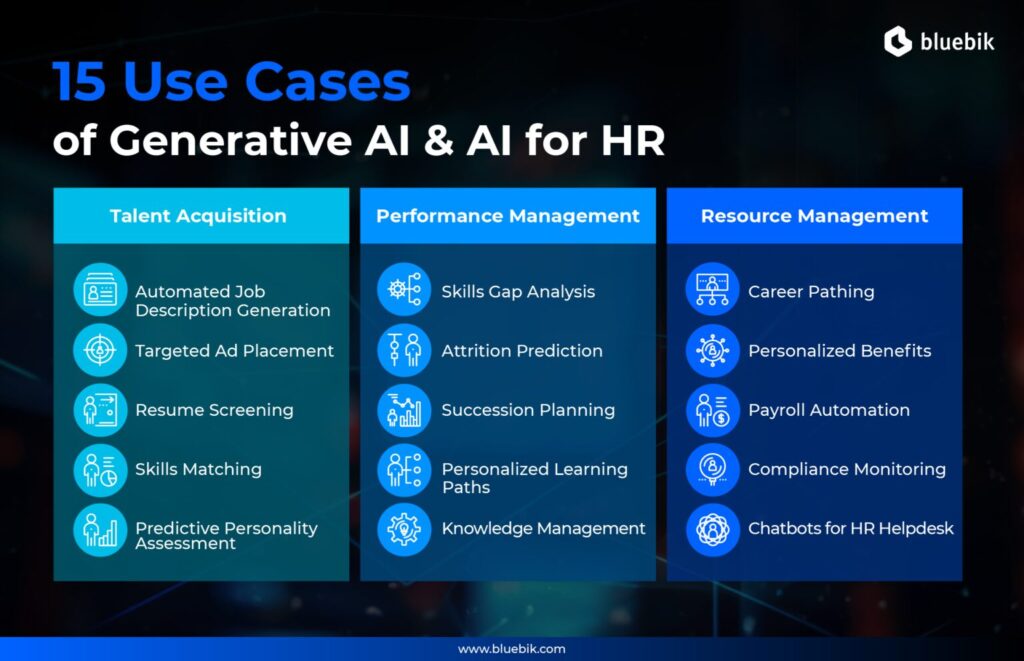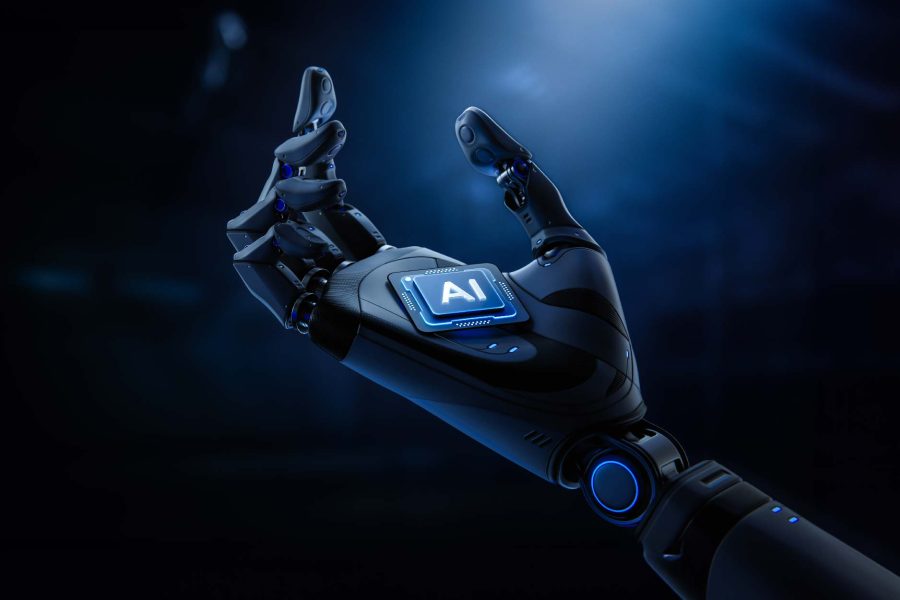ในปัจจุบัน งาน HR ถือเป็นกลไกเบื้องหลังการขับเคลื่อนธุรกิจที่จะขาดไปไม่ได้ เนื่องจากบุคลากรคือทรัพยากรสำคัญขององค์กร เมื่อองค์กรเติบโตขึ้น งาน HR จึงต้องพัฒนาให้ทันตามการขยายตัวของธุรกิจ ทำให้ฟังก์ชันงาน HR บางส่วนต้องปรับเปลี่ยนกระบวนการให้รวดเร็วขึ้น มีประสิทธิภาพยิ่งขึ้น และสามารถรองรับกลยุทธ์ด้านบุคลากรของธุรกิจได้ในระยะยาว
สำหรับการขับเคลื่อนงาน HR เทคโนโลยีใหม่ๆ สามารถเข้ามาเพิ่มขีดความสามารถในกระบวนการทำงานได้อย่างมหาศาล ไม่ว่าจะเป็น Generative AI (Gen AI) และ AI (Artificial Intelligence) หรือปัญญาประดิษฐ์ ซึ่งเป็นเทคโนโลยีที่สามารถประมวลผลข้อมูลอย่างรวดเร็ว และมีประสิทธิภาพสูง โดยใช้กระบวนการเรียนรู้ของเครื่องจักร (Machine Learning) เพื่อสร้างโมเดลที่สามารถทำนายผลลัพธ์จากข้อมูลได้อย่างแม่นยำ
แม้ว่า Gen AI จะได้รับการพัฒนาจนนำไปใช้งานได้หลากหลายด้าน และใช้ช่วยในการทำงาน HR ได้แบบครบจบทุกกระบวนการ อย่างไรก็ตาม ในการสร้างประสิทธิภาพการทำงานในระยะยาวไม่ใช่แค่การนำเทคโนโลยีเข้ามาใช้ แต่ต้องมีการเตรียมความพร้อมและวางกลยุทธ์เพื่อให้ AI สามารถสร้างผลลัพธ์ได้จริง
นายพิพัฒน์ ประภาพรรณพงศ์ ผู้อำนวยการฝ่าย Advanced Insights ของบริษัท บลูบิค กรุ๊ป จำกัด (มหาชน) หรือ BBIK ในฐานะที่ปรึกษาชั้นนำผู้ให้บริการด้านดิจิทัลทรานส์ฟอร์เมชั่น เปิดเผยว่า แม้ปัจจุบัน เทคโนโลยี Gen AI ได้รับการพัฒนาจนสามารถนำไปใช้งานได้หลากหลายรูปแบบ แต่สำหรับการนำไปใช้งานภายในองค์กรอย่างมีประสิทธิภาพนั้น ควรมีการเตรียมความพร้อมใน 3 เรื่อง ได้แก่ 1. บุคลากรที่ควรมีทักษะในการถามคำถามเพื่อป้อนคำสั่งที่เหมาะสมสำหรับให้ AI สร้างผลลัพธ์ 2. กระบวนการที่ต้องมีการแนวทางการเก็บข้อมูล หรือมีนโยบายด้าน Data Governance ในการควบคุมดูแลด้านข้อมูลโดยเฉพาะในการเอา AI ไปใช้สำหรับการทำงานในส่วนต่างๆ และ 3. เทคโนโลยีที่ระบบภายในองค์กรควรเป็น Private System ที่มีการปกป้องดูแลความปลอดภัยของข้อมูลส่วนตัวพนักงาน
สำหรับงาน HR นั้น หากมองในภาพรวมแล้วสามารถแบ่งออกเป็น 3 ส่วนหลักๆ ด้วยกัน ประกอบด้วยการสรรหาบุคลากร (Talent Acquisition) การบริหารผลการปฏิบัติงาน (Performance Management) และการบริหารจัดการทรัพยากรบุคคล (Resource Management) ซึ่งทั้ง 3 ส่วนนั้น Gen AI สามารถนำไปปรับใช้ได้ในทุกกระบวนการ
Use Case Prioritization วางกลยุทธ์ปรับใช้ Gen AI
บลูบิค มองว่า ก่อนนำ Gen AI ไปใช้จริงสำหรับงาน HR องค์กรควรทำความเข้าใจและเตรียมความพร้อมเรื่องข้อมูลก่อน ซึ่งโดยปกติแล้วข้อมูลในงาน HR แบ่งเป็นข้อมูลภายในองค์กร ที่ครอบคลุมตั้งแต่ข้อมูลผู้สมัครงาน ข้อมูลบริษัท นโยบายบริษัท ข้อมูลสิทธิประโยชน์ต่างๆ และระบบการบริหารจัดการด้าน HR อีกส่วนคือข้อมูลภายนอก เช่น เทรนด์ตลาดแรงงาน นโยบายและการรับสมัครงานของบริษัทคู่แข่ง ค่าเฉลี่ยเงินเดือนและทักษะของพนักงานในตำแหน่งต่างๆ
เมื่อเตรียมพร้อมเรื่องข้อมูลแล้ว องค์กรควรเลือกกรณีการใช้งาน หรือ Use Case ที่เหมาะสมกับธุรกิจ โดยเลือกตามการจัดลำดับความสำคัญ (Use Case Prioritization) ซึ่งส่วนใหญ่แล้ว พิจารณาตาม 2 แกนหลัก คือ Business Impact ซึ่งเป็นผลลัพธ์และคุณค่าที่จะเกิดขึ้นต่อธุรกิจในแง่ผลตอบแทนจากการลงทุน (Return on Investment) รวมถึงความสอดคล้องกับกลยุทธ์องค์กร และ Feasibility ที่เป็นความพร้อมในการพัฒนาและใช้งานจริง โดยแนวทางการทำ Use Case Prioritization นั้น สามารถปรับเปลี่ยนได้ตามวัตถุประสงค์ขององค์กร
สำหรับแนวทางที่บลูบิค เข้าไปช่วยแนะนำองค์กรธุรกิจในการเลือก Use Case ที่เหมาะสม ประกอบด้วย 4 ขั้นตอนหลักด้วยกัน
- สร้าง Use Case โดยพิจารณาจากปัญหาของธุรกิจ เป้าหมายหรือวัตถุประสงค์ขององค์กร และตัวขับเคลื่อนหลักที่ส่งผลต่อการบรรลุเป้าหมายนั้นๆ (Key Driver)
- รวบรวม Use Case จากการทำ Value Stream Mapping แผนผังที่จะช่วยให้มองเห็นภาพรวมของกระบวนการและกิจกรรมต่างๆ ที่สร้างคุณค่าให้ธุรกิจ แล้ววิเคราะห์ผลลัพธ์ที่จะเกิดขึ้นต่อธุรกิจและความพร้อมในการดำเนินการ
- วางแผนการปรับใช้ Use Case ตามการจัดลำดับความสำคัญเชิงกลยุทธ์ ที่มีโอกาสประสบความสำเร็จมากที่สุด
- เลือก Use Case ที่เป็น Quick-win ซึ่งสามารถทำได้เร็วและสร้างผลลัพธ์ได้อย่างรวดเร็ว เพื่อเริ่มดำเนินการก่อน
15 Gen AI & AI Use Cases แนะนำสำหรับงาน HR
ในมุมมองของ บลูบิค แล้ว จากประสบการณ์ในการเข้าไปช่วยวางกลยุทธ์ Gen AI Use Cases ที่น่าสนใจสำหรับงาน HR ทั้งการสรรหาบุคลากร การบริหารผลการปฏิบัติงาน และการบริหารจัดการทรัพยากรบุคคล สามารถแบ่งออกเป็น 15 Use case ด้วยกัน

- การสรรหาบุคลากร (Talent Acquisition)
- Automated Job Description Generation – วิเคราะห์คำอธิบายตำแหน่งงาน ข้อมูลบริษัท และเทรนด์ในภาคธุรกิจ และสร้างคำอธิบายตำแหน่งงานที่เหมาะสมที่สุด
- Targeted Ad Placement – วิเคราะห์ตลาดแรงงานและความสนใจของผู้สมัครงาน จากนั้นให้คำแนะนำในการทำโฆษณารับสมัครงานบนเว็บไซต์และโซเชียลมีเดีย
- Resume Screening – ระบุผู้สมัครที่เหมาะสมที่สุดจากทักษะและประสบการณ์ทำงานแบบอัตโนมัติ เพื่อหาบุคลากรที่เหมาะกับความต้องการขององค์กร
- Skills Matching – จับคู่ผู้สมัครงานที่ตรงกับความต้องการของตำแหน่งงาน โดยอิงจากทักษะและประสบการณ์ทำงาน
- Predictive Personality Assessment – ระบุแนวโน้มลักษณะผู้สมัครงานที่เหมาะสมกับวัฒนธรรมองค์กร
- การบริหารผลการปฏิบัติงาน (Performance Management)
- Skills Gap Analysis – วิเคราะห์ทักษะพนักงานและให้คำแนะนำในการเสริมทักษะที่จำเป็นต่อการทำงานในอนาคต
- Attrition Prediction – วิเคราะห์ข้อมูลและผลการปฏิบัติงานเพื่อหาความเสี่ยงการลาออก
- Succession Planning – ระบุตัวพนักงานที่มีศักยภาพได้รับการเลื่อนตำแหน่ง
- Personalized Learning Paths – แนะนำโปรแกรมฝึกอบรมพนักงานที่เหมาะสมกับตำแหน่งงาน ทักษะ และประสบการณ์ทำงาน
- Knowledge Management – จัดระบบเอกสาร ระเบียบปฏิบัติงานต่างๆ เพื่อให้ง่ายต่อการค้นหาสำหรับพนักงาน
- การบริหารจัดการทรัพยากรบุคคล (Resource Management)
- Career Pathing – ช่วยพนักงานในการสร้าง Career Path ที่เหมาะสมกับตัวเอง
- Personalized Benefits – สร้างแพคเกจสิทธิประโยชน์ต่างๆ ที่เหมาะสมกับพนักงานแต่ละคน
- Payroll Automation – เพิ่มประสิทธิภาพของระบบบัญชีเงินเดือน เช่น การคำนวณค่า OT หรือการเข้ากะของพนักงาน
- Compliance Monitoring – ติดตามและแจ้งเตือนความเสี่ยงด้านการปฏิบัติการ
- Chatbots for HR Helpdesk – แชทบอทตอบคำถามเกี่ยวกับ HR ตลอด 24 ชั่วโมง
สุดท้ายแล้ว การสร้างผลลัพธ์ทางธุรกิจจาก AI ไม่ใช่แค่การทำเทคโนโลยีมาใช้งาน แต่ต้องมาจากการวางกลยุทธ์และการจัดลำดับความสำคัญว่าจะนำ AI ไปใช้สร้างคุณค่าให้องค์กรที่จุดไหน และต้องมีความพร้อมเรื่องข้อมูลสำหรับพัฒนาโมเดล AI ให้สร้างผลลัพธ์ได้ตามความต้องการ สำหรับธุรกิจที่ต้องการวางกลยุทธ์ด้าน AI เพื่อเพิ่มศักยภาพการแข่งขันและสร้างการเติบโตให้องค์กร Bluebik มีทีมงานผู้เชี่ยวชาญด้าน Big Data & Advanced Analytics ที่สามารถให้บริการโซลูชันครบวงจรและการวิเคราะห์ข้อมูลขั้นสูงตั้งแต่ระดับกลยุทธ์ไปจนถึงการนำไปปรับใช้ให้เหมาะสมกับองค์กร ติดต่อเราสอบถามหรือปรึกษาเราได้ที่
☎ 02-636-7011












